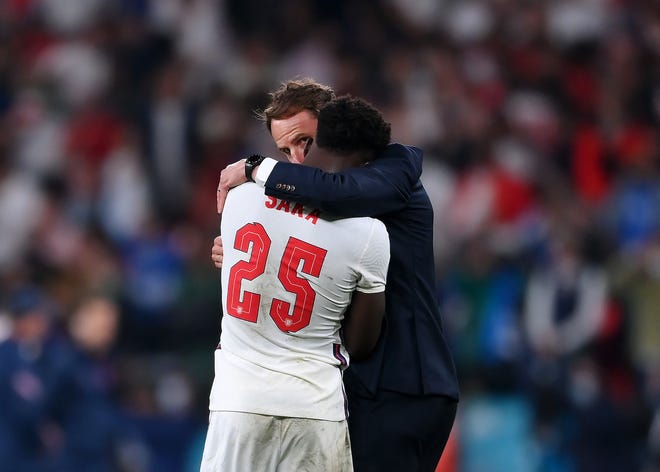When three Black English soccer players missed spot-kicks Sunday in a penalty shootout -- following a 1-1 tie with Italy in the Euro 2020 final -- a number of Black friends, and Black people on Twitter, all had the same reaction: Those three men are going to face incredible racial abuse.
That's exactly what happened, and it was entirely predictable. Marcus Rashford and Jadon Sancho, 23 and 21, respectively, and Bukayo Saka, who is just 19, faced such intense online abuse it's prompted police investigations in the UK.
In the aftermath of another ugly and racial moment in English soccer, there's lots of hand-wringing, and blaming, of social media. Twitter and other mediums are of course part of the problem, but the issue is far deeper. The issue is cultural. The issue is a purely human one.
More:Police investigate racist abuse of three England players
England's Bukayo Saka was consoled by his head coach, Gareth Southgate, after his penalty miss Sunday in the Euro 2020 Championship Final.
Hatred always seems to find an unending source of fuel. It defeats hashtags, speeches and common sense. It inhabits outhouses and White Houses. It's on Main Street and Downing Street. It's the most potent enemy today; more contagious than any virus and more threatening than any asteroid. Hatred is so consuming that it takes a wonderful game like soccer -- a pure, beautiful game -- and transforms it into something ugly.
Hatred is unbeaten because we keep helping it win despite the fact it doesn't need our assistance.
No American has the right to point fingers at the UK and its problem with race. Hell, we elected a white nationalist as president, and hundreds of white nationalists tried to overthrow democracy. We are having our own battles with race here.
But what happened in the UK will seem strikingly familiar to people in the U.S. The English team has been a strong anti-racist force, taking a knee before games to highlight the problem with racism, the same way Colin Kaepernick did, and each time, it was booed.
Prime Minister Boris Johnson, at the start of the Euro tournament, wouldn't condemn the booing, thus seeding the ground for potential abuse later. Johnson's political opposition told the media after the Italy game that "inactions of leaders have consequences."
Keir Starmer, leader of the Labour Party, added that Johnson, "Failed the test of leadership because whatever he says today about racism, he had a simple choice at the beginning of this tournament in relation to the booing of those who were taking the knee. The prime minister failed to call that out, and the actions and inactions of leaders have consequences, so I'm afraid the prime minister's words today ring hollow."
What those young Black men face is a cultural issue, not an algorithmic one, and it's similar to the United States, where centuries of systemic racism still have significant impact, and politicians mine racism as a weapon.
Donald Trump did it here. Last month, Johnson’s spokesman, when asked about the booing and why Johnson didn't condemn it, said the prime minister is “more focused on action rather than gestures.” By saying that, Johnson's spokesman was essentially encouraging fans who were booing to keep doing so.
Gary Neville, a former Manchester United player and now a TV broadcaster, said he wasn’t surprised the three players were targeted.
“The prime minister said it was OK for the population of this country to boo those players who are trying to promote equality and defend against racism,” he said on Sky News. “It starts at the very top, and so for me, I wasn’t surprised in the slightest that I woke up this morning to those headlines.”
"You don’t get to stoke the fire at the beginning of the tournament by labeling our anti-racism message as ‘Gesture Politics’ & then pretend to be disgusted when the very thing we’re campaigning against, happens," tweeted defender Tyrone Mings to a member of the Conservative Party, who had earlier blasted the players.
English soccer has gotten better since its hooligan days, but there was clearly a building up to a moment like this. All that was needed was a match.
Should social media do more to stop online racist abuse? Of course.
The problem is racism is both embedded in the UK culture (and America's), while simultaneously significant swaths of the country don't believe systemic racism exists. I mean Hell , in the U.S., some of us don't even want to teach the history of racism.
Before Twitter can clean up its mess, human beings have to clean up ours.
Significant parts of the English soccer fanbase don't see soccer as a place for anti-hate gestures, the way some NFL fans didn't want to see Kaepernick take a knee.
The UK government may care a little but not enough. There are anti-hate groups working tirelessly to drain this swamp. Twitter says it has removed thousands of tweets and permanently banned some accounts. Yet Twitter has done something like this before, and the racist incidents keep happening.
There's a mural that was created for Rashford in Manchester for his charitable work, mainly pushing the government to provide free lunches for people during the pandemic. It was vandalized. It's since been covered with pictures, hearts and words of encouragement from members of the community, but the fact it was defiled says a lot about where we are, and it's not a good place.
The Black players, in many ways, were effectively alone and facing remarkable levels of vile, guttural racism.
That's because of us. All of us.
Not because of Twitter.

